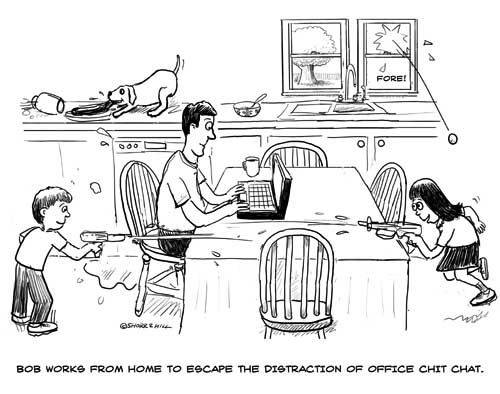How to Stop Interruptions so you can Focus
How often does this scenario happen to you? You are at your desk, and have just started working on an important task. Just as you start to make progress, your phone rings. Although it’s a 30 second call, when you return to your work you have difficulty jumping back in. By the time you regain your momentum a customer emails you, and your concentration is broken again. Throughout the day you keep getting interrupted, and at the end of the day you realize you haven’t really gotten anything done on your project.
Speaking from personal experience, I have many days where I am incredibly busy, but never really get anything done. And this has only gotten worse now that I am working from home due to COVID 19. In addition to my normal work interruptions, I am now getting interrupted by my kids, my wife, and even by the news. I long for the day when I could sit at my desk, and only deal with my colleagues’ distractions.
I know a lot of you are in the same boat as me. Working through interruptions and focusing on a critical task has become even more difficult, and that is why I wanted to write this article. Below you will find a quick way to assess your own level of dealing with interruptions and a simple approach to overcoming these interruptions. I have used these tools in previous years, and I thought we could all benefit from them now.
How to Stop Interruptions so you can Focus
How do you deal with interruptions?

Sometimes interruptions are a necessary part of your job. If a pissed off customer is calling you, its probably smart to drop what you are doing to focus on their issues. But the majority of interruptions probably aren’t that critical. So it begs the question, why do we allow ourselves to be interrupted by non-critical things?
The simplest answer is that we do not know the criticality of an interruption before they occurs. It is only after the fact, when you know whether or not it was a worthwhile interruption. So in some sense, you cannot prevent non-critical interruptions, but you can encourage or discourage them. It comes down to how you handle interruptions.
Below is a questionnaire about how you act when an interruption occurs. As you will see, you may actually be rewarding and encouraging people to interrupt you. In the table below you will see different statements to complete the sentence “When someone interrupts me I…”. For each row, decide if Option A or Option B is more like how you would act, and count how many As and Bs you selected.
| Option A | Option B | |
| …stop everything and focus on dealing with this new challenge | __ | … ask the interrupter why it needs to be done now |
| … do what they want me to do to solve the problem/address the issues | __ | … ask questions so they work out the solution themselves, and wont need me if it happens again |
| … get some satisfaction from the feeling of being needed or necessary | __ | … feel annoyed with myself for allowing a situation were I am needed or necessary |
| … empathize / sympathize with their problem | __ | … explain the impact that stopping me to address their issue has on me and my priorities |
| … once the task is completed, chat about other issues that they want to discuss | __ | … once the task is completed, discuss how to prevent it from happening again or promptly return to my priorities |
| … carry on discussing other aspects of the issue, even if they aren’t urgent | __ | … if they want to talk future, suggest they come back at another time |
Please note that different option statements work for both personal and professional settings, and it is important to assess how you act in both settings. Your ability to focus may be amazing at your office, but you might be encouraging interruptions when working from home.
How to Stop Interruptions so you can Focus
Do you encourage or discourage interruptions?

If you had more A selections, then you are actually encouraging people to interrupt you. You are solving their problems, actively engaging in their issues, and fully immersing yourself in their situations. It is no wonder that people are interrupting you constantly.
If you had more B selections, then you are actually discouraging interruptions. You are trying to teach them how to solve these problems on their own, and prioritizing your time when helping them. Please note that column B behaviors are not seen as mean or unhelpful. You are still helping your colleague, friend, or family member, but you are doing it in a way that doesn’t make them dependent on you.
Focusing on building self sufficiency in the people that are interrupting you is a great start, and is something that everyone should prioritize. Too many people go into problem solver mode. This approach is incredibly fast and effective, but it has long term consequences. You need to think of yourself like a Master fisherman. It may be incredibly easy for you to catch a fish for someone, and you may do it in a fraction of the time that they would do it. But in the end, that person becomes dependent on you for fish. Instead, spends the extra time needed to teach your colleagues “how to fish.”
How to Stop Interruptions so you can Focus
How to stay focused (the PACE approach)

Too often we look to solve interruptions as fast as possible, so we can get back to work. “Yes I will review your presentation later tonight…” “Sure I can attend that meeting tomorrow…” Unfortunately, these quick solutions can sometimes lead to even more interruptions, and all of the sudden you are drowning in work.
So instead of getting into problem solver mode, I recommend you follow the PACE approach. It may seem like common sense, but a lot of people I know don’t do it. They jump into autopilot mode and give the first solution that comes to their mind. The PACE approach forces you to consider all the different alternatives, and makes sure you make the right decision based on the circumstances.
P = Pause
Take a breath, and don’t just immediately respond to the interruption. For my own development, this is difficult for me. Too often I have already hit the reply button, and started writing the reply email, before I have actually read the full request. Pausing before you react will give you the necessary time to think. Taking a moment to pause is especially important when your interruptions come in the form of young children.
A = Ask
Take time to ask some questions about the request. What is the person actually asking you to do? Is this something easy or hard for you to fulfill? Is this a top priority for you, or even for the person making this request? If you don’t help, what would the consequences be? By asking the tough questions, you are analyzing the situation and assessing your different options.
C = Choose
Obviously at some point you need to make a decision and choose how to react. You may say yes to their request, or politely decline. Or by asking your questions, you might realize that you could solve their request in another way. This is an important step, because you don’t want to be stuck in the Ask phase. While asking too few questions is a quick way to get overwhelmed, analysis paralysis is just as bad.
E = Engage or Explain
Once you have decided, you can either engage in resolving the interruption, or politely explain that this is not something you can focus on right now. This is also the phase where you invest in the “discouraging interruption” behaviors from the previous section.
How to Stop Interruptions so you can Focus
Stop the interruptions and stay focused

We perform our best work when we are focused on the task at hand, and this means we have to limit our interruptions. When writing this article, I choose to write it late at night. On one hand this is a tough choice because it is late, and I am usually tired from work and from my 2 boys. But the reality is that I cannot write when the boys are awake, and the house is full of chaos. Writing late at night may be tough due to tiredness, but it is the only time that I can can be truly focused.
When I am in the office, I have similarly built a system to limit interruptions. I have an agreement with my colleagues and teammates that when I wear my headphones I need to focus. They know that I do not wish to be disturbed, and for the most part they respect my wishes. They wait until I finish my task, and then approach me with their request. My teammates understand that most interruptions and requests can wait an hour, and those that truly can’t wait are worth me breaking my concentration.
Reducing your interruptions and maximizing your ability to focus will help you get stuff done. You will be more productive, and avoid the common pitfall of spreading yourself too thing across too many things. So whether you are stuck in the chaos of working from home with kids or just dealing with interrupting colleagues, using the PACE approach and helping people solve their own problems will help you stay focused even through constant interruptions.
How to Stop Interruptions so you can Focus
More Virtual Team Activities / Exercises
- 4 questions that build Psychological Safety
- Coat of Arms
- Two Pictures
- Build an Availability Calendar
- Four-Word Snapshots
- Communication Best Practices
- Tips from Remote Workers
I would like to give credit to the company who is the source of the PACE approach and the self-assessment. I have had the pleasure to work with the international training company Mind Gym, which specializes in integrating best in class practices, science, and energetic activities into 90 minute training modules. Mind Gym has created some of the best material I have ever worked with.

Leave a Reply